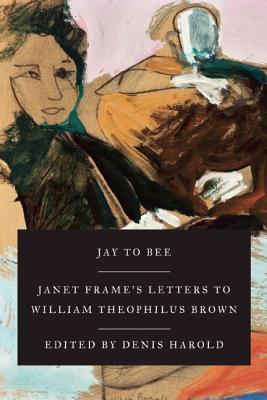
Yaddo January, 1970 (handwritten)

Hello again, without restraint while it snows powdery snow & the trees appear to have been visited in the night by Old Age.
I’m enjoying my big light studio very much and now that the missing link, Dan Curley, writer, has arrived I shall work here in the evening away from crowded West House which becomes (yes, Bee) a hive of activity with balls (ping-pong) knocking to & fro & pawns being surrendered or captured ‘en passant’ etc. The sitting-room-library reminds me, then, of Games Night in the looney bin—as the term was.
Last evening when everyone had left the diningroom & the small adjoining ‘conversation’ room I stayed alone to hear Sonata 32 op 111 Beethoven played by Schnabel, on the repaired pornograph.
Ned Rorem who leaves on Tuesday is giving us drinks in his Pink Room on Monday evening. I suspect that he finds Yaddo too formal. I find it even more formal than when Elizabeth Ames was Director, as the new Director & his wife are there among us, from the moment we leave our studios, & though, as I said, they are pleasant people their presence creates its own formality. They have a tendency to want to ‘inspect’ work & here the painters & sculptors, maybe composers, would be most inconvenienced. The young black painter (he’s 22) was disconcerted when the directors asked would he make an appointment for them to visit his studio to see his painting. ‘They mean well…’
Tomorrow it has been arranged that we play ‘Charades’ in the evening.
Good God.
Good God.
Good God.
To be fair to the directors, they did say, ‘It must never be said that anyone at Yaddo was forced to play Charades’. The pressure is there, though.
The ‘raving old man’, Kenneth Burke, talks often to me & I like to hear him because I have always respected his scholarship. He translated Death in Venice which is being re-issued. He translated it as a labour of love because he was so overcome by the story. His mind at 75 is agile, full of unusual & exciting analogies; he roves in a rich landscape of ideas.
I can’t help thinking of poor old Harrison K[inney] who seemed to be so limited & struggling with only Thurber as his life-line.
(I had a note from Jean Boudin—remember her frightful niece & the forced ‘poetry’ session?—Arnold Dobrin’s wife has left him. End of gossip transmitted by Steve (the subway fiend) to Jean B)
I am just about to receive 3500 dollars in advance & royalties (this is after 2300 have been deducted in U.S. tax and agent’s commission— gross 5800!)—more than I’ve ever had.
There’s an important Arts Conference in New Zealand in April. It’s part of a National Development Conference to plan the way the country should go & I feel very guilty because having received a special invitation (I’m not going) I’ve been given a chance to help to decide government policy in the Arts & I’m doing nothing about it. I have a remit form & on it I may suggest a place for N.Z. like Yaddo or MacDowell, unrestricted by nationality, where painters, composers, writers etc. can meet & write limericks together, play anagrams, drink rose hip tea and go to bed if they feel like it, AC & DC & all other currents switched on.
I hope you & Paul are at peace with your work & Ned with his stones. Ned really does look more like a blossom than a cat; probably he harbours rubies black & white and Dr Gilbride (a Thomas Mann surname, surely) is an international jool thief, cultivating stones as oyster-farmers cultivate pearls.

It’s strange not to be using my typewriter. I had forgotten that words arrive so quietly; their soundlessness has impressed me over the past 3 days; and yet I miss their shape; their shape in writing is too close to myself.
How is Santa Barbara? How is everything, the sky & the live oaks & the hills & the people, the people & the animals? And the piano with its shiny bones? A worn shine as if it had been kissed by pilgrims.
Goodbye; I mean Au Revoir.
And love AC, DC, 12v (harmless as a torch battery).
Cheese cake last night. Tonight strawberries and ice-cream.
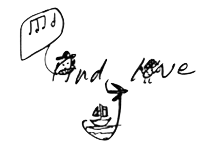
Yaddo February, 1970
Unrestrained letter.
O Western Bee
So Far Far Away
‘Gilt-Surcingled, Burnished’
—I’m Faint
with Incense of Absence!
Would I Were
in thy Home Clover
Furnished
with thy Comb Honey—
Yours Blue Jay
(who’s taken Over
the mad Correspondence
of the Late Fly.)
(Bee,
Ignore that Rhyme.
Fly is alive and Well
Buzzing to Tell
of Time
and Eternity
—Yours, Emily
As for Blue Jay—A Crow
in a Blue Overcoat
a Bone in Her Throat
a Cry like a Hornblast
the Vanity to Know
that a million Blue Jays
are the Blue Light Cast
by Falling Snow.
Believe me,
Bee,
Yours from the Grave,
Emily.)
****** ***********
Meals at Yaddo
– Director Granville Hicks—
Chocolate Cream Puff—
the Overthrow
of the Politics
of Enough—
Anarchic Appetite—
Diet Dethroned—
Seize the Bright Gobful Life-Prop
– Stomach Moaned—
Miserable—Stop!
******** ************
(Bee,
(by the Way)
how’s the Hive today?
Does Paul still paint
the Creation of the Butterfly?
Ned Blossom (bean-pretence)
in the Pine Tree?)
mountains and/or volcanoes
(snow-capped) (extinct)
(cloud-shrouded) (dormant)
(lion-haunted) (active)
of love.
J.
How’s that for lack of (paper) restraint?
Applications invited for PeeDauntal Scholarships.
Canine, feline, leonine, bovine, humine applicants welcome.
Dunedin May, 1970
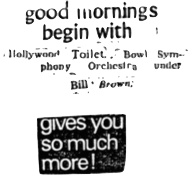
B, Dear
You are an angel; yet I, a mortal, find it impossible to feel the guilt I ‘should’ feel because you’ve sent me The Requiem and the Schubert and Schumann recording. Thank you so much. The Requiem is so beautiful, I think, and now is the time for me to listen to it when my thoughts are so much in U.S. and when I’m feeling depressed over the Cambodian affair. Will any poet, ever again, write a song of love and praise for an American President? Whitman’s words are a large part of the beauty of The Requiem but I love the music too, the words are embedded there as if they were growing. The singing in some of the choruses is messy sometimes—it seems—because I can’t hear the words but when the words are audible they and the music are so immediate and poignant. Phrases like ‘the large unconscious scenery of my land’*—but I won’t go on thus. The Schubert and Schumann recording is beautiful too, breath-taking in places. Perhaps I am being fanciful when I say that music can take away one’s breath because it behaves like breath: it is like one of those cells, but a cell of sound and movement, that enters and takes over the life it inhabits.
Blah blah blah?
You are an angel then. Let me know if a ‘longing as if for sin haunts your dream!’† * [footnote: *Come at once] I know those poems by heart now, simply because I’ve heard you reading them.
Meanwhile back in my Antipodean omicron I’m experiencing (between Requiems and Sonatas) the first winter day, unexpected, with a snow-sky and rain from the south, and hail and sleet. Sometimes the grey in the sky divides and shows a patch of satin blue which is quickly recovered. My friend Dorothy came on her monthly visit. Before she comes she always phones to find out what the clouds are like because she visits partly to see the sky. She and her family have just farewelled ‘grandsire’—her husband’s father-in-law—who is eighty six, at the start of a lone voyage he is making to Europe.
Some of my luggage with your sweater in it arrived and I can only explain my delight by saying that I must have a cat mentality. I think I’ll invite Ned to come and stay here while I go to Live Oaks Inn and snuggle down on the washer, and eat cut liver, and stalk the house and garden, and sit between the two geraniums (after sniffing each one), and even wangle a visit to Dr Gilbride! Talking of cats—I’ve been exchanging glances lately with a grey and black tom which came—I mentioned it—and sat to wash himself on the steps. The other day when I went down the garden I found him sitting curled in a little nest under the strawberry tree. Waiting for the birds, I suppose. When he saw me he sprang up, looked guilty and was about to fly off through the tangled grass
![]()
when I said, Hello. I swear he looked astonished. People just don’t

say hello to strange cats wandering in their garden . . . do they, Ned? It’s this grey and black tom who’s been beating up the lady cats at night. And it’s the same cat who lives about a hundred yards down the road and on fine days sits on the white stone wall and snoozes and on wet days lies curled up on a fancy bedspread in the front bedroom.
I made myself French toast for breakfast this morning . . . My work is going now, I mean moving. I’m afraid I miss you terribly. I try not to be Miss Nostalgia all the time, but I am.
Meanwhile back at Live oaks Inn, there is a state of confrontation in the diningroom between our characters Bill, Paul, Ned, and the carnivorous plant. Pandemonium, you may remember, reigned. Now read on.
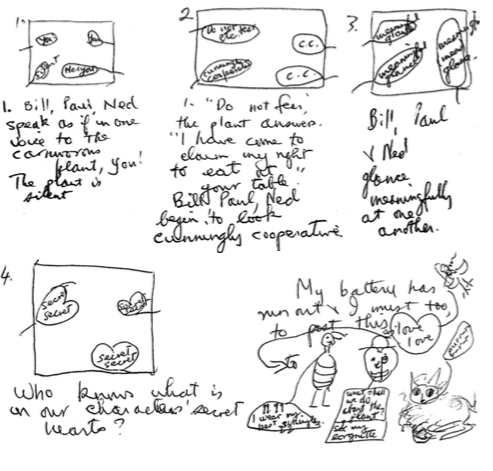
My battery has run out & I must too, to post this.
Dunedin June 10, 1970

Just a small letter with my usual indecent collage, and some thought-waves, and touchie-feelies going your way. It’s morning and I’m just settling down for my work which is going at a leisurely pace and getting complicated (this is what I like) with complications I never dreamed of. It’s pretty rotten writing. I wish I could deceive myself.
I loved the sketch of the three of you taking the sun in the patio. (Another of my favourites is the performing trio, particularly that bewitching look on Ned’s face as he tunes his cello.)
I’ve done nothing, been nowhere—except in phantasy. I went for a walk yesterday to the top of my street and then down into the valley, and then along, and up. There are some very ugly pretentious houses up my street, most built within the past few years as the old houses were pulled down. The street ends in fields and hills. (A Quaker refugee from California lives further up, with his wife and three or four young children. He lectures in the English Department of the University.)
I walked down into the valley (‘the valley so lonely’) where, on one side, the sun shines for only a few hours each day, and many of the old houses are empty or being used as places for scrap metal, engineering works, and so on. On the sunny side there was a garden with the jonquils already in bloom and finished, yet winter is scarcely begun ‘summer scarcely begun. The violets, a few picked, the rest dead . . .’ (I do listen to your poetry-readings, B, but not excessively and not trying consciously to remember them but they stay in my mind, they have stayed even if I had heard them only once. B plus R.M.R. achieve a perfect take-over of memory.)
I walked to the corner where the Gardens Post Office is (most of my letters find their way there), just beside the Public Gardens which extend up the hill not far from where I live. I went into the Gardens to see if the monkeys they had once were still there, and I could not find them. I wandered around the aviary, I looked at the scores of birds on the pond, and the dead hydrangeas which I’m beginning to understand more, after having read rilke’s poem. I have always been rather impatient with hydrangeas (that’s a title—Impatient with Hydrangeas) because even when they are in full bloom they appear faded and withered. I am learning to understand anemones, too. It reminds me of what you were saying one day about paintings, how some exist for themselves and make no plea for you to go to them, it is you must make the
![]()
effort. My favourites are the yellows, golds, reds, all the auxiliary suns in the gardens. I think it takes courage to be a small sun.
At last I wrote to May Sarton; it had been on my mind that I was going to write to her, to answer her last letter. I owe Jo a letter, too. No ‘owe’ is not the right word. I’ll not have the commerce of correspondence, but letters are tyrannical things, they take on a life of their own. I don’t look on my letters to you as letters, not really, they’re just a way, for me, of being there from time to time with the three live and lively oaks.
Enough.
I bet Paul’s party was a great success. Was it at the house? How does Ned feel about parties? He probably has some ghastly interpretation of what’s going on, even imagining that his Masters have suddenly multiplied like amoebae or that the world has suddenly just flowed in like a tide and house isn’t house and Ned’s any more, it’s just beach from now on with the tide coming and going.
No, I haven’t got myself a kitten. I have casual communication, as I told you, with a grey and black cat that lives down the road and that once ventured to visit me and climb the stairs to the back door. He also, on sunny days, has a nest in my garden. He is usually sitting on the letter-box of his house down the street when I pass, and when I say hello kitty, there’s always such a startled look on his face that I can only describe, stealing from Edmund Wilson, as ‘The shock of recognition’. He almost falls off the letter-box in his surprise. Then he says, I never expect you to speak to me and you always do. I keep forgetting that you and I have an understanding.
Truly, that’s what he says.
I always forget, he continues, that you’re one of us and not one of them. Grandiose phantasy or not, I enjoy it.
Now I’ll say goodbye. I’m thinking of you and Paul and Ned a lot and send kisses, some for the Steinway too, and a deadlier than deadly one for the carnivorous plant.
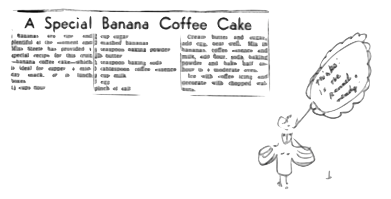
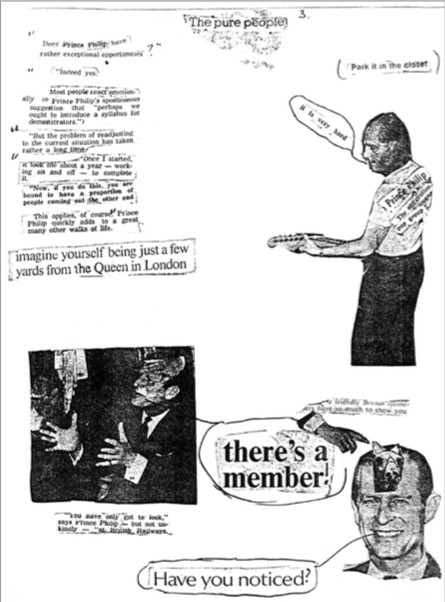
Dunedin August, 1970
Hi, Tena koutou,
from the Antipodean waste of noise-polluted Evans Street where outside my gate an electric drill is working road-works. The day is grey, damp, chilly, and I sit snuggled in Santa Barbara sweater which retains 99 percent of its snuggle, and I think of my live oaks, demi-live, semi-live, wholly live, who will now be setting off to the studio—maybe not—I think it is washing-up time, sonata-time, vitamin-time, Petro-malt-time. Here it is Tuesday. There it is Monday. I should be able to send you bulletins about the future, as I live in it.
I am up out of bed now but the devastating ‘flu has left me infantilly weak-kneed which is what I always have been. It has been a nasty epidemic here with many deaths, so many that I am tired of death for the moment. I’d like to come over to you and laugh, laugh—everything is so grim here—ah how long it is since I laughed pure, impure laughter! It is a million years ago. Everyone here is so serious and I feel myself becoming caught in the serious groove, grim, unsmiling, and it scares me. I have friends here, as you know, but none are—is close in the sense that it is possible to laugh with them. Now that is very strange. It means one is semi-live. But I’ve told you this over and over again, and bored you with it . . . I will arise and go now and go to Santa Barbara where I felt among the live oaks like a working zip—strange comparison, here it’s like being a stuck zip with nothing and no-one to adjust it. I think zips have a wonderful time—you call them zippers? Up and down all their lives, in the grooves that are made for them.
Enough of that now. My greeting at the beginning is a Maori greeting. Jacquie, my guest, brought me some Maori language records which I’ve been playing. A wonderful way to learn a language. The Baxter family are all now returned to Wellington and Jim has gone on to his haven in Jerusalem. Grandmother is selling their old house in Brighton—now that’s a place one would dream of—by the roaring sea, beside a brown river, with peach, apple and pear trees, and an alpine garden, and passionfruit. I have visited there only twice and each time, the old lady (about 86 now) has taken me to see her alpine garden, collected from plants she, as an active member of the Naturalist’s club, has gathered from her walks around Dunedin hills and elsewhere. Every plant is labelled, with English and Latin name, and she knows them all, and she talks of them as a mother talks of her children. I remember her saying proudly, ‘Now this is a little Hebe.’
Her maiden name, by the way, was Millicent Brown.
I dreamed last night I was with you and we all had a beautiful blue meal, I have never seen such a lovely blue. And there were two mountain lions sunning themselves on the roof. And the light was gold, drenching light.
Goodbye for now to my much-missed L.O.’s, and all kinds of mentionable, unmentionable, tangible, intangible, monostitched, laconic, desperate, deliberate, makeshift, conclusive, unanswerable, goatish, porcine, mulish, zoomorphic, dovelike, recoverable, conservative, waterproof, bloodsucking, unauthorized, fictitious, authentic
LOVE.
from me and Thesaurus
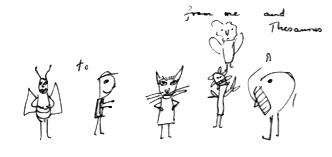
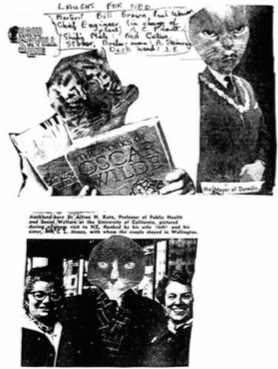
* quotation from Walt Whitman’s poem ‘When Lilacs last in the Dooryard Bloomed’
† quotation from Rilke’s poem ‘The Angels’
Excerpted from JAY TO BEE: Janet Frame’s Letters to William Theophilus Brown, edited by Denis Harold. Used with permission of Counterpoint. Copyright © 2016 by Janet Frame Literary Trust.


